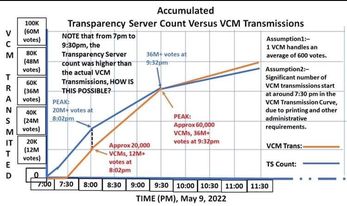Was last May’s presidential election rigged? It looks so for former information communications technology Secretary Eliseo Rio. He concluded fraud after comparing the Commission on Elections official data with the “transparency server” that publicized the vote count.
COMELEC’s transmission report contradicts the transparency server of PPCRV (Parish Pastoral Council for Responsible Voting).
Notably in PPCRV’s count, votes peaked at 20 million on the first hour after precincts closed. Then it tapered to 13.2 million on the second hour, onto four days.
Inversely, in COMELEC’s transmission compilations from precinct vote-counting machines (VCMs), votes first trickled in the first hour, peaked on the second, then tapered thereafter.
PPCRV’s results are “statistically, mathematically and logically highly improbable if not impossible,” Rio posted on social media. “All electronic or manual counts start low, then peak, and lessen.”
COMELEC precinct rules make it unlikely for VCMs to transmit one hour after end of balloting, Rio explained. At 7 p.m. Election Day, the Board of Election Inspectors allows voters within 30 meters of the precinct to vote. Then the BEI chairman announces formal closure to party reps and NGO watchers. Commands are typed in and confirmed with the VCM to stop accepting any more ballots. These take several minutes.
The VCM then prints out eight copies of national tallies. Each national candidate’s votes are stated: ten presidential, nine vice presidential, 64 senatorial, 173 party-lists. Each copy takes three to four minutes to print on long rolls of thermal paper, or 24-32 minutes for eight copies.
“It takes five seconds to print out your small voter receipt for one president, one VP, 12 senators and one party-list,” Rio said. “The complete precinct tally naturally takes longer. Sometimes printing stops and the BEI loads a fresh roll of thermal paper.”
As DICT head, Rio chaired the COMELC Advisory Committee (CAC) of the 2019 midterm election. “We did time-and-motion studies to determine the length of the process, and there were no presidential and VP bets.”
COMELEC officials led by chairman George Garcia presented the transmission report in an Ateneo School of Government forum on October 18. A graph showed accumulated VCM transmissions.
“In that graph, VCM transmissions peaked after two hours, in stark contrast with the transparency server that peaked one hour after voting closed,” Rio said. “How can that happen when the VCMs multi-sent simultaneously to the COMELEC central server, transparency server, and municipal server?”
From start to finish, “PPCRV’s transparency server showed a consistent, unchanged trend of presidential and VP contenders’ rankings. It seemed the transparency server was used to condition the public mind to expect such results,” Rio concluded.
PPCRV countered that “VCM transmissions were much faster this 2022 because three telcos participated.” Also, “constant vote ratio can be explained by Law of Large Numbers.”
To dispel doubts, Rio wrote COMELEC on July 15 to disclose the transmission logs that telcos submitted as required.
COMELEC balked, saying those were too voluminous given the 106,439 VCMs. Rio rebutted that all COMELEC had to do was post the logs on its website for public scrutiny. Whereupon, COMELEC said the logs are now with the CAC and Joint Congressional Oversight Committee. No reply from both.
On November 3, Rio petitioned the Supreme Court to compel COMELEC to disclose the logs. Impleaded for “mandamus” were VCM supplier Smartmatic and telcos Smart, Globe and Dito. Telcos normally delete their logs after six months. Laws require Comelec to store its logs for three years.
After the four-day count, PPCRV deleted all files in newsmen’s laptops, then deleted the transparency server a week later.
Rio swore nonpartisanship. Even Bongbong Marcos decried VCM fraud when he lost the 2016 VP race.
Jarius Bondoc is an award-winning Filipino journalist and author based in Manila. He writes opinion pieces for The Philippine Star and Pilipino Star Ngayon and hosts a radio program on DWIZ 882 every Saturday. Catch Sapol radio show, Saturdays, 8 to 10 a.m., DWIZ (882-AM).
The views expressed in this article are the opinions of the author and do not necessarily reflect the editorial stance of LiCAS.news.









